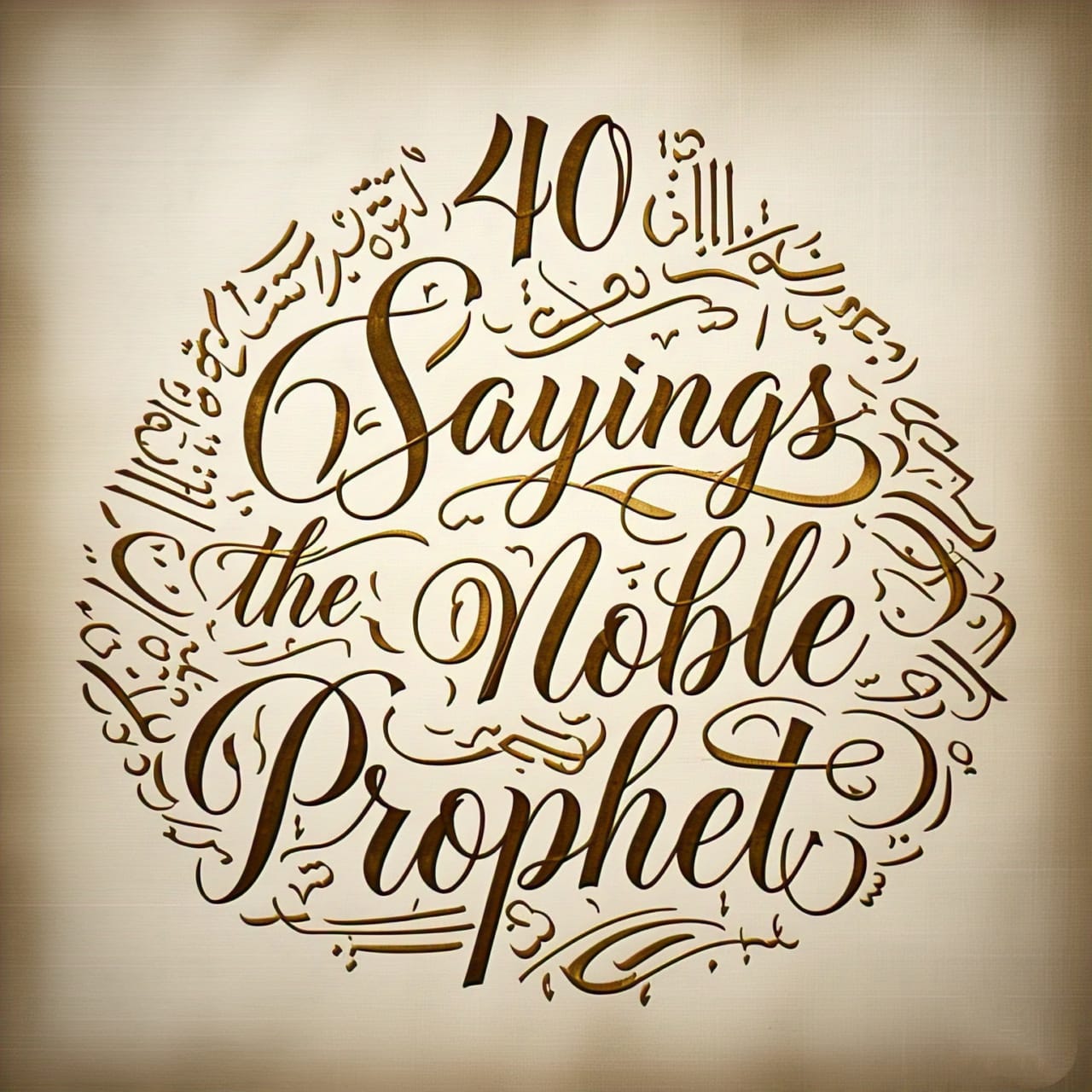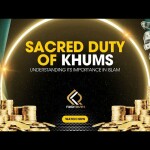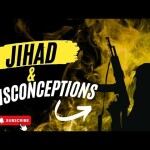40 Sayings (Hadiths) from the Holy Prophet (Peace be upon him & his progeny):
The beloved Prophet Muhammad (Peace be upon him & his progeny) said:
1. "Educate your children with my love, the love of my Ahlul Bayt, and the love of the Qur’an."
(Ihqaq al-Haqq, vol. 18, p. 498)
Message: Establishing a bond between youth and the Ahlul Bayt prevents them from being led astray.
________________________________________
2. "Listen and obey the one whom Allah has granted authority over you, for indeed, it is the foundation of Islam."
(Amali al-Mufid, p. 14)
Message: Leadership and governance are the keys to Muslim unity and honour.
________________________________________
3. "Love for the sake of Allah, hate for the sake of Allah, befriend for the sake of Allah, and oppose for the sake of Allah. Indeed, one cannot attain the Wilayah (divine guardianship) of Allah except through this. No person will truly taste the sweetness of faith, no matter how much he prays and fasts, unless he practices this."
(Wasa'il al-Shi'a, vol. 11, p. 440)
Message: Strengthening love and enmity with an ideological foundation gives depth to faith.
________________________________________
4. "Love for me and love for my Ahlul Bayt will be beneficial in seven critical situations where fear is immense:"
1. At the time of death,
2. In the grave,
3. During resurrection,
4. When receiving the record of deeds,
5. During accountability,
6. During the weighing of deeds,
7. While crossing the Sirat (the bridge over Hell).(Amali al-Saduq, p. 18)
5. He said in his Farewell Sermon:
"O people! Your Lord is One, and your father is one. You are all from Adam, and Adam was from dust. 'Indeed, the most honored of you in the sight of Allah is the most righteous among you' (Qur'an 49:13). An Arab has no superiority over a non-Arab except through piety."
(Tuhaf al-Uqul, p. 34)
Message: Ethnic and racial pride, as well as boasting about language or color, are rejected in Islam. Piety is the true standard of superiority.
________________________________________
6. "A believer is one whom the Muslims trust regarding their wealth and lives. A Muslim is one from whose hands and tongue other Muslims are safe. A true emigrant is one who abandons evil."
(Man La Yahduruhu al-Faqih, vol. 4, p. 362)
________________________________________
7. "Whoever wakes up in the morning without concern for the affairs of Muslims is not among them. And whoever hears a man calling for help, saying, 'O Muslims!' but does not respond, is not a Muslim."
(Wasa'il al-Shi'a, vol. 11, p. 559)
________________________________________
8. Narrator: The Prophet (PBUH) sent a military detachment on a mission. When they returned, he said:
"Welcome to those who have completed the minor jihad, but the greater jihad remains for them."
They asked: "O Messenger of Allah! What is the greater jihad?"
He replied: "The struggle against one's own self (Jihad al-Nafs)."
(Al-Ikhtisas, p. 240)
Message: The self that commands evil (Nafs al-Ammara) is an internal enemy, and struggling against it is even harder. A true champion is one who conquers in this battle.
________________________________________
9. "A good companion is better than solitude, and solitude is better than an evil companion. Teaching goodness is better than silence, and silence is better than teaching evil."
(Bihar al-Anwar, vol. 74, p. 84)
10. "Whoever dies without having an Imam to whom he listens and obeys has died the death of ignorance."
(Al-Ikhtisas, p. 269)
Message: Even in the era of occultation, following leadership and guidance is a sign of an ideological life.
________________________________________
11. Leadership and Its Conditions
"Leadership is only suitable for those who are worthy of it. Whoever calls people to him while there is someone more knowledgeable than him among them, Allah will not look at him on the Day of Judgment."
(Al-Ikhtisas, p. 251)
Message: In assigning social responsibilities, priority should be given to qualifications and merit, not personal relationships.
________________________________________
12. The Seven Rights of a Believer Upon Another Believer
"A believer has seven rights upon another believer, which Allah has made obligatory upon him:"
1. He should regard him with respect.
2. He should love him in his heart.
3. He should share his wealth with him.
4. He should refrain from backbiting about him.
5. He should visit him when he is ill.
6. He should attend his funeral.
7. After his death, he should speak only good about him.
(Man La Yahduruhu al-Faqih, vol. 4, p. 398)
________________________________________
13. The Best Path and the Worst Blindness
"The best way is the way of the prophets, the most honorable death is the death of martyrs, the worst and most severe blindness is deviation after guidance, the best actions are those that bring benefit, the best guidance is that which is followed, and the worst blindness is the blindness of the heart." (Al-Ikhtisas, p. 342)
________________________________________
14. The Worst People in the Community
"Shall I inform you of the worst among you?"
They replied, "Yes, O Messenger of Allah."
He said:
"Those who spread gossip, those who create division among friends, and those who seek faults in innocent people." (Man La Yahduruhu al-Faqih, vol. 4, p. 375)
________________________________________
15. Eight People Who Should Not Blame Anyone but Themselves
"There are eight people who, if they are humiliated, should blame no one but themselves:"
1. The one who goes to a feast without being invited.
2. The guest who dictates to the host.
3. The one who seeks kindness from his enemies.
4. The one who expects generosity from the stingy.
5. The one who interferes in a secret matter between two people without being invited.
6. The one who disrespects the ruler.
7. The one who sits in a gathering where he does not belong.
8. The one who speaks to someone who does not listen to him.
(Man La Yahduruhu al-Faqih, vol. 4, p. 355)
________________________________________
16. The Best Moral Traits in This World and the Hereafter
"Shall I guide you to the best morals of this world and the Hereafter? Maintain ties with those who cut you off, give to those who deprive you, and forgive those who wrong you." (Tuhaf al-Uqul, p. 45)
________________________________________
17. The Importance of Knowledge
"Through knowledge, Allah is obeyed and worshiped. Through knowledge, Allah is recognized and believed in as One. Through knowledge, family ties are maintained, and the lawful and unlawful are distinguished. Knowledge is the guide of reason." (Tuhaf al-Uqul, p. 28)
________________________________________
18. Advice on Good Character
"I advise you to have Taqwa (God-consciousness), truthfulness in speech, fulfilling promises, returning trusts, avoiding betrayal, speaking gently, spreading peace, respecting neighbours, showing mercy to orphans, performing good deeds, and keeping your desires in check."
(Tuhaf al-Uqul, p. 26)
________________________________________
19. Three Essential Qualities for a Stable Life
"Three things, if absent in a person, make all his deeds meaningless:"
1. Piety that restrains him from disobedience to Allah.
2. Knowledge that enables him to respond wisely to ignorant people.
3. Intelligence that helps him deal with people properly.
(Tuhaf al-Uqul, p. 07)
________________________________________
20. Five Things to Seize Before It’s Too Late
"Seize five things before five things:"
1. Your youth before old age.
2. Your health before illness.
3. Your wealth before poverty.
4. Your free time before becoming busy.
5. Your life before death.
(Makarim al-Akhlaq, p. 459)
Message: Utilizing one's blessings for spiritual growth and recognizing divine favors is essential.
________________________________________
21. The Path to Paradise and the Fear of Hell
"Whoever longs for Paradise rushes towards good deeds,
Whoever fears the Fire abandons desires,
Whoever anticipates death turns away from pleasures,
And whoever practices asceticism in this world finds calamities easy to bear."
(Makarim al-Akhlaq, p. 447)
________________________________________
22. Love and Care for Children
"Love children and show kindness to them. If you promise them something, fulfill it, for they see you as their providers."
(Makarim al-Akhlaq, p. 219)
Message: Paying attention to the delicate aspects of dealing with children is crucial for parents and educators.
________________________________________
23. The Reward for Supporting a Husband in Worship and Learning
"Any woman who helps her husband in performing Hajj, Jihad, or seeking knowledge will receive a reward from Allah equivalent to the reward given to the wife of Prophet Ayyub (AS)."
(Makarim al-Akhlaq, p. 201)
Message: The cooperation and support of spouses in religious, academic, and social struggles contribute significantly to success.
________________________________________
24. Fearing Disease but Not Hellfire
"How astonishing it is that a person avoids certain foods fearing illness, yet does not refrain from sins fearing the Fire!"
(Makarim al-Akhlaq, p. 147)
Message: Cultural and moral concerns are more important than material and economic ones.
________________________________________
25. The Two Groups That Shape the Nation
"There are two groups in my nation; if they are righteous, the nation will be righteous, and if they are corrupt, the nation will be corrupt."
The companions asked: "O Messenger of Allah, who are they?"
He replied: "The scholars and the rulers."
(Bihar al-Anwar, vol. 74, p. 154)
Message: The actions and stances of key figures in society have a great impact on the community.
________________________________________
26. Dealing with Innovators and Doubters
"After me, when you see those who create doubt and introduce innovations in religion, express your disassociation from them, curse them frequently, speak against them, and confront them so that they do not dare to corrupt Islam."
(Wasa'il al-Shi'a, vol. 11, p. 508)
________________________________________
27. The Danger of Acting Without Knowledge
"Whoever acts without knowledge will cause more harm than good."
(Bihar al-Anwar, vol. 74, p. 150)
Message: Tasks should be entrusted to those who are competent and qualified, and one should avoid interfering in matters beyond their expertise.
________________________________________
28. The Value of Questioning in Knowledge
"Knowledge is like a treasure, and its key is questioning. So ask questions—may Allah have mercy on you—for four people benefit from it: the questioner, the one who answers, the listener, and the one who loves them."
(Bihar al-Anwar, vol. 74, p. 144)
Message: Recognizing the importance of questions and answers in education and knowledge-seeking.
________________________________________
29. Allah’s Blessing for a Righteous Servant
"O Abu Dharr! When Allah intends goodness for a servant, He grants him understanding in religion, instils asceticism in his heart, and makes him aware of his own faults."
(Bihar al-Anwar, vol. 74, p. 80)
________________________________________
30. The Worst People on the Day of Judgment
"The worst people before Allah on the Day of Judgment are those who are respected out of fear of their evil."
(Usul al-Kafi, vol. 2, p. 327)
Message: Some rule over hearts, while others rule by force!
________________________________________
31. The Virtue of Good Character and Generosity
"Blessed is the one whose character is good, whose nature is pure, whose inner self is righteous, whose outward conduct is noble, who spends the excess of his wealth in charity, who refrains from unnecessary speech, and who treats others with fairness and justice."
(Usul al-Kafi, vol. 2, p. 144)
________________________________________
32. The Key to Piety and Contentment
"Fulfill the obligations of Allah, and you will be among the most pious people.
Be content with what Allah has apportioned for you, and you will be among the wealthiest people.
Refrain from what Allah has forbidden, and you will be among the most righteous people.
Treat your neighbors well, and you will be a true believer."
(Amali al-Mufid, p. 350)
________________________________________
33. Avoiding Hypocrisy and Fault-Finding
"It is enough of a flaw in a person that he finds faults in others while being blind to the same flaws in himself, or that he criticizes people for something that he himself cannot abandon."
(Amali al-Mufid, p. 67)
________________________________________
34. The Prophet’s Longing for His Future Followers
"I wish I could see my brothers!"
Abu Bakr and Umar said, "O Messenger of Allah, are we not your brothers, having believed in you and emigrated with you?"
He replied:
"You are my companions, but my brothers are those who will come after you. They will believe in me, love me, support me, and confirm my truthfulness despite never having seen me. I wish I could meet my brothers!"
Message: The significance of faith and religious commitment during the time of occultation and the latter days.
(Amali al-Mufid, p. 63)
35. Mutual Support in Righteousness
"May Allah have mercy on a child who helps his parents in righteousness,
May Allah have mercy on a parent who helps his child in righteousness,
May Allah have mercy on a neighbor who helps his neighbor in righteousness,
May Allah have mercy on a companion who helps his friend in righteousness."
(Wasa'il al-Shi'a, vol. 11, p. 592)
________________________________________
36. The Effects of Charity and Good Deeds
"Acts of kindness protect against bad deaths,
Giving charity in secret extinguishes the wrath of Allah,
Maintaining family ties increases lifespan,
And every act of goodness is a form of charity."
(Wasa'il al-Shi'a, vol. 11, p. 536)
________________________________________
37. Deeds Are Presented to the Prophet
"Your deeds are presented to me on Monday and Thursday evenings.
If they are good, I praise Allah for them.
If they are bad, I seek forgiveness from Allah for you."
(Wasa'il al-Shi'a, vol. 11, p. 388)
Message: The awareness that our deeds are presented to the Prophet and the Imams can play a significant role in preventing sin.
________________________________________
38. Self-Accountability Before Judgment Day
"Take account of yourselves before you are held accountable.
Weigh your deeds before they are weighed for you.
Prepare yourselves for the great presentation (on the Day of Judgment).”
(Wasa'il al-Shi'a, vol. 11, p. 380)
Message: Self-accountability is one of the most effective and necessary means of self-purification and moral refinement.
________________________________________
39. The Virtue of Seeking Forgiveness
"Blessed is the one who finds in his record of deeds on the Day of Judgment, under every sin, the phrase 'I seek forgiveness from Allah.'”
(Wasa'il al-Shi'a, vol. 11, p. 355)
Message: Repentance is a path to perfection, and no one is ever completely shut off from divine mercy.
________________________________________
40. Signs of the End Times
The holy Prophet said in his Farewell Sermon:
"Among the signs of the approaching Day of Judgment is the neglect of prayer, following of desires, inclination toward whims, excessive love of wealth, and selling one's religion for worldly gain.
At that time, the heart of a believer will melt inside him like salt dissolving in water, due to the evil he sees around him but cannot change."
(Wasa'il al-Shi'a, vol. 11, p. 276)
________________________________________








